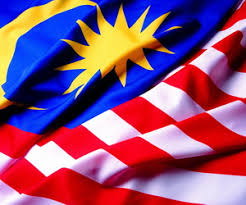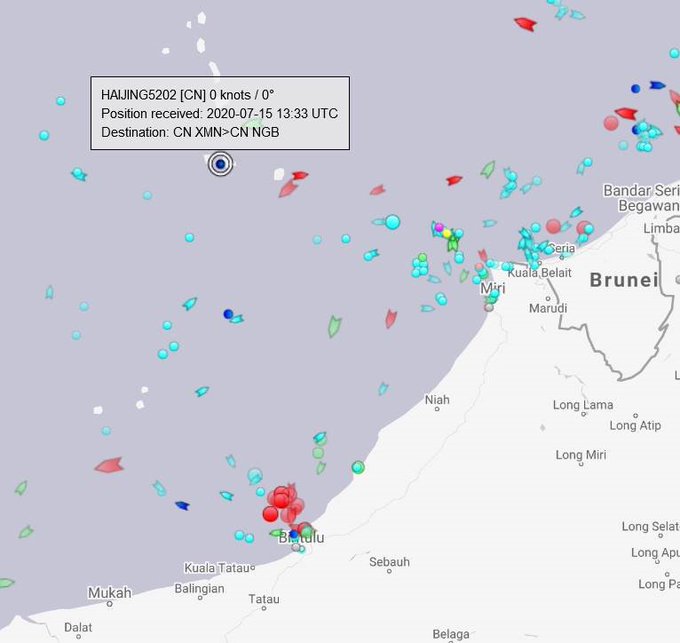by Ganesh Sahathevan
Two weeks ago Malaysia , or rather the Royal Malaysian Airforce (RMAF/TUDM) complained that 16 PLA planes flew over or near Luconia Shoals:
This week Malaysia complains that the PLA-N hasin truded into Malaysian waters near Luconia Shoals
Meanwhile, Malaysia still refuses to re-assert authority over the Shoals.
TO BE READ WITH
Wednesday, July 15, 2020
Hishamuddin's claim that there have been no Chinese ships in Malaysian waters for 100 days shown to be false: China continues to assert control over Luconia Shoals
by Ganesh Sahathevan
From a tweet by Gregory B. Poling Senior Fellow for Southeast Asia and Director, Asia Maritime Transparency Initiative
Retweets and comments
SEE ALSO
China is particularly interested in asserting
sovereignty over Luconia Shoals ,
Chinese Coast Guard in strategy to bully
Malaysia into submitting to at least de facto control
Saturday, October 5, 2019
From a tweet by Gregory B. Poling Senior Fellow for Southeast Asia and Director, Asia Maritime Transparency Initiative
Malaysia's FM says there have been no Chinese ships in Malaysian waters for 100 days. But there have been. Every. Single. Day.
CCG 5203 patrolled Luconia Shoals from Apr 2; replaced by 5204 on May 22; replaced by 5202 on July 7. Here it is today. malaymail.com/news/malaysia/
3:56 AM · Jul 16, 2020Twitter Web App
Retweets and comments
SEE ALSO
Thursday, September 26, 2019
China is particularly interested in asserting
sovereignty over Luconia Shoals ,
Chinese Coast Guard in strategy to bully
Malaysia into submitting to at least de facto control
by Ganesh Sahathevan
The SCMP has reported:
“There don’t appear to be any other contested areas where CCG [China Coast Guard] presence is so persistent, and where China clearly wants regional counterparts to know they are present,” the report said.
“Beijing has evidently taken a special interest in Luconia, Second Thomas and Scarborough shoals. It seems to be wagering that if it can maintain a semi-permanent CCG presence for long enough, regional states will eventually accede to its de facto control of those areas.
The SCMP has reported:
Some Chinese coastguard vessels deployed in the South China Sea have deliberately made themselves visible to rival claimants of the
by turning on tracking signals – a move analysts described as an attempt to assert sovereignty.
by turning on tracking signals – a move analysts described as an attempt to assert sovereignty.
A report released by the Washington-based Asia Maritime Transparency Initiative said it had identified 14 Chinese coastguard vessels broadcasting automatic identification system (AIS) signals while patrolling the Luconia Shoals, Second Thomas Shoal and the Scarborough Shoal over the past year.
.(AMTI said that)
many Chinese coastguard vessels patrolling in other parts of the South China Sea broadcast the signals only when entering and leaving port.But the vessels patrolling the three shoals appeared to have made efforts to be seen. One at Luconia had broadcast AIS signals on 258 of the past 365 days.
“There don’t appear to be any other contested areas where CCG [China Coast Guard] presence is so persistent, and where China clearly wants regional counterparts to know they are present,” the report said.
“Beijing has evidently taken a special interest in Luconia, Second Thomas and Scarborough shoals. It seems to be wagering that if it can maintain a semi-permanent CCG presence for long enough, regional states will eventually accede to its de facto control of those areas.
It appears that the incident involving the Malaysian flag reported on this blog in 2016 was a first step in what can now be seen to be a larger strategy to assert sovereignty over the South China Sea.
END
SEE ALSO
uesday, August 9, 2016
Pedra Branca/Batu Puteh decision suggests Malaysia has surrendered right to Luconia- removing own flag from Luconia Shoals in stark contrast with past practise
by Ganesh Sahathevan

These submissions by the Government Of Singapore to the International Court Of Justice in the Pedra Branca/Batu Puteh matter were part of Singapore's ultimately successful defence against Malaysia's claim:
6.53 It should be noted that Malaysia has demonstrated her awareness of the significance of flying national emblems over territory for purposes of evidencing sovereignty. Malaysia demanded (and obtained) the lowering of the Singapore Ensign flown until 3 September 1968 over another lighthouse facility maintained by Singapore at Pulau Pisang, a territory over which Singapore does not exercise or claim sovereignty.
7.11 In the present case, neither Johor nor Malaysia ever protested against the regular flying of the British and Singapore emblems over Pedra Branca, even though this was done as a clear display of State authority and without seeking consent from Malaysia or Johor, and Malaysian officials were fully aware of this.
7.12 Moreover, Malaysia’s long silence regarding this clear and public manifestation of Singapore’s sovereignty over Pedra Branca since 1847 is in sharp contrast to Malaysia’s response to the flying of the Singapore marine ensign on the lighthouse administered by Singapore at Pulau Pisang, an island which belongs to Malaysia. In 1968, Malaysia objected to the flying of the Singapore flag over Pulau Pisang Lighthouse320. Following Malaysia’s objection, Singapore ceased flying her flag on the Lighthouse. In contrast, at no time had Malaysia ever protested against Singapore’s flying of her flag over Pedra Branca. 7.13 If Malaysia had any belief that she had a claim to sovereignty over Pedra Branca, one would have expected Malaysia to have exercised or attempted to exercise her sovereign authority over the island in the same way that she had done with respect to Pulau Pisang, if only to put on record that, notwithstanding Singapore’s presence on Pedra Branca, Malaysia had sovereign authority over the island. This omission on Malaysia’s part is especially significant as it occurred shortly after Singapore left the Federation of Malaysia in August 1965, when the governments of both countries treated each other with the utmost caution on bilateral issues.
7.14 Singapore contends that, given these facts, Malaysia had consciously (and correctly) decided that, in contrast with Pulau Pisang, any protest was not appropriate with respect to the flying of the Singapore flag on Pedra Branca.
7.11 In the present case, neither Johor nor Malaysia ever protested against the regular flying of the British and Singapore emblems over Pedra Branca, even though this was done as a clear display of State authority and without seeking consent from Malaysia or Johor, and Malaysian officials were fully aware of this.
7.12 Moreover, Malaysia’s long silence regarding this clear and public manifestation of Singapore’s sovereignty over Pedra Branca since 1847 is in sharp contrast to Malaysia’s response to the flying of the Singapore marine ensign on the lighthouse administered by Singapore at Pulau Pisang, an island which belongs to Malaysia. In 1968, Malaysia objected to the flying of the Singapore flag over Pulau Pisang Lighthouse320. Following Malaysia’s objection, Singapore ceased flying her flag on the Lighthouse. In contrast, at no time had Malaysia ever protested against Singapore’s flying of her flag over Pedra Branca. 7.13 If Malaysia had any belief that she had a claim to sovereignty over Pedra Branca, one would have expected Malaysia to have exercised or attempted to exercise her sovereign authority over the island in the same way that she had done with respect to Pulau Pisang, if only to put on record that, notwithstanding Singapore’s presence on Pedra Branca, Malaysia had sovereign authority over the island. This omission on Malaysia’s part is especially significant as it occurred shortly after Singapore left the Federation of Malaysia in August 1965, when the governments of both countries treated each other with the utmost caution on bilateral issues.
7.14 Singapore contends that, given these facts, Malaysia had consciously (and correctly) decided that, in contrast with Pulau Pisang, any protest was not appropriate with respect to the flying of the Singapore flag on Pedra Branca.
Given that these arguments led to the decision against Malaysia, one would expect that the Government Of Malaysia would exercise and strenuously defend its right to fly the flag on all its possessions, but this was obviously not the case with Luconia Shoals. It is hard to see that by removing its own flag, Malaysia has not surrendered its right to the Shoals.
(Hans Berekoven, an Australian marine archaeologist) chose Malaysia's independence day, August 31 last year, to protest against the situation by raising the Malaysian flag on the tiny island.
It is the first time the video of the incident has been released.
"I took the curator of the museum that we're working with, and a couple of other Malaysian friends, and a journalist from the Borneo Post," he said.
They mounted a stainless steel flagpole into a cement footing and raised the Malaysian flag, as the China Coast Guard vessel watched from about 500m offshore.
"They must have got on the blower to Beijing and Beijing must have got on the blower to Kuala Lumpur, because suddenly there was a big kerfuffle in KL," Mr Berekoven said.
The next morning, a Malaysian aircraft flew low over Mr Berekoven's boat and the island.
"A Malaysian coast guard vessel was despatched. Went out there and unbolted the flag," he said.
END
Reference





No comments:
Post a Comment